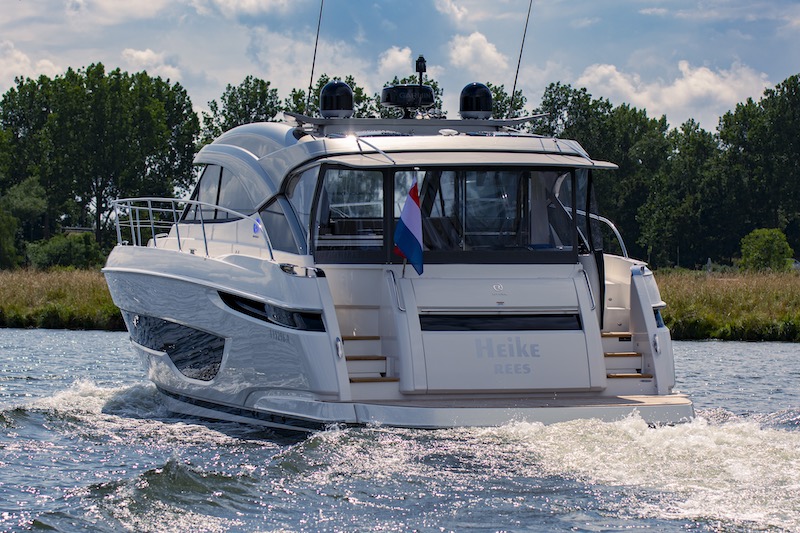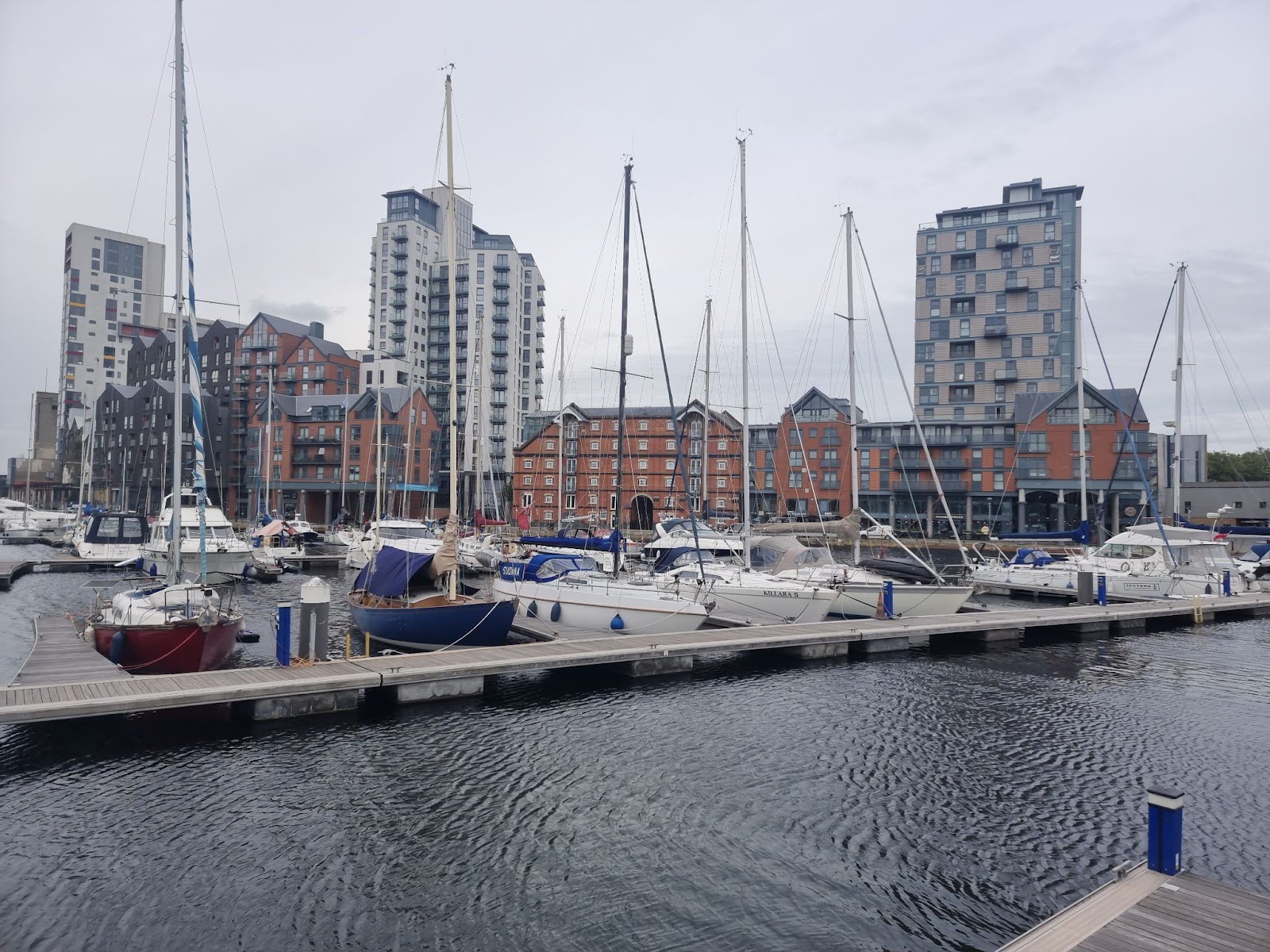On a dank Monday morning in November I found myself surveying the landscape beneath me from my raised vantage point in South Gloucestershire. Languishing in the far distance was Wales and to my right was Cromhall Quarry, a former limestone quarry that naturally flooded when works ceased. This relic of a commercial past is now home to the
South West Maritime Academy who have rejuvenated it to provide a wide range of contemporary commercial training and education courses. And on focusing upon my more immediate surroundings, I was part of a cohort of people in whose company I was to spend the remainder of the week.
I am the Managing Director of a business that sells boats and yachts up to 50m and as a company policy we actively promote training to our customers. Most see the real point, that it is less about compliance and more concerned with enjoyment; having a skill set of sufficient standard that the terrors of close quarter handling and parking the thing don’t outweigh the upside of driving along on the crest of a wave without the confines of a yellow brick road. There is no doubt that I am fortunate in regularly being the helmsman, normally the master, of a variety of boats and as such have accumulated a reasonable number of sea miles over the course of my lifetime. With this philosophy in mind I was now sat in a classroom with nine others and about to commence a training course that would convert ‘leisure licences’ to ‘commercial qualifications’, an endeavour I expected to be a little more hardcore but in a similar vain to those leisure courses previously undertaken.
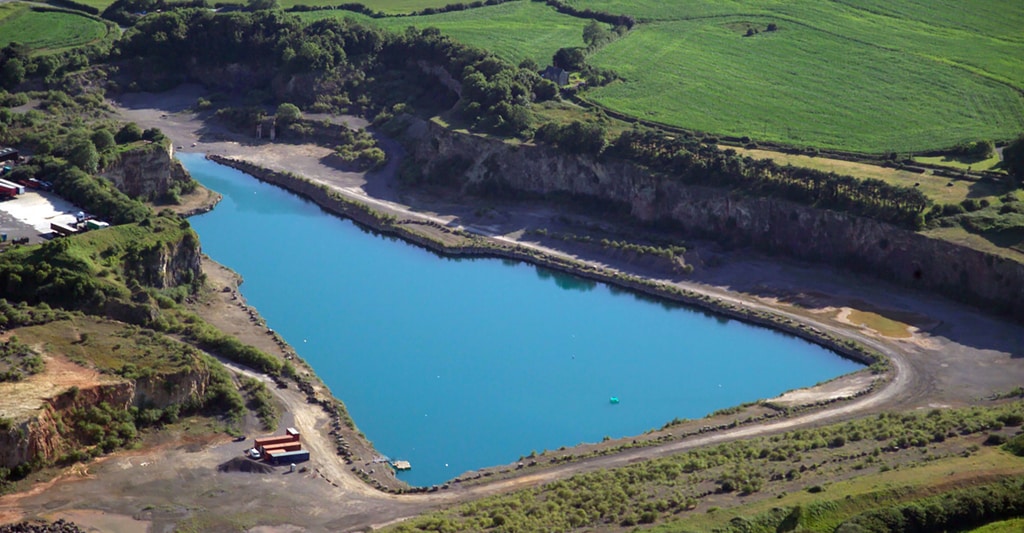
We were jovially welcomed by John, the Academy’s enthusiastic owner and Managing Director and who is clearly a morning person; his greeting was by and large met with stony silence with just the occasional nodding of approval. I can only think that he was sizing us up to see who might cause trouble later in the week if a fractured left toenail was suffered by an unfortunate soul. A kindly gentleman by the name of Aaron soon took the reins and we were into our first module of five which was ‘first aid’. Aaron’s usual job is as a serving officer within the local fire brigade and has thirty years of service. I got the impression that he was a ‘on the scene’ line manager of others and had seen plenty of mishaps over the years. Coincidentally, it had been thirty years since I last thought about a first aid course and it clearly showed. I had become accustomed to an approach of ‘all injuries can be sorted by wrapping copious quantities of masking tape around a wound, then off to hospital for the utterly guaranteed amputation’! The day past quickly and a variety of useful skills were learnt; the goal for Aaron was clearly not that fewer hospital visits occurred, but rather the amputation ratio was reduced as a result of the patient having been better cared for prior to their arrival. In a twist of cruel fate, I spoke to my local Screwfix rep that evening who was enquiring as to when I might need my next truck load of masking tape.
The second day was crystal clear and fresh, and my knoll was offering a great view of the surrounding countryside. On the day of the US general election the group was even starting to talk to each other and I learnt that there were engineers and chefs, events management people and charter skippers amongst us to describe just a few. Both male and female, some were younger and others were more of my own modestly increasing age. Today’s instructor was a lady called Sabrina, who turned out to be a senior deck officer working for a well-known cross channel ferry company. She is certainly a committed seafarer who was extremely knowledgeable and forthright in a most affable way. In a moment of daydreaming later on that morning I wondered what sort of Jean Luc Picard character had her to his side and wouldn’t he be ever so slightly admiring and intimidated at the same time.
Today was ‘sea survival’ day and we all knew that this would involve getting wet during the afternoon. I will admit it now that I was actually looking forward to a splash in the quarry as I don’t mind getting purposefully wet. During the morning a variety of carefully curated knowledge was imparted, most of which had an accompanying doom and gloom tale of strife, woe and loss of life. Of comfort was the knowledge that the maritime industry has a rich and dedicated history of industriously learning from its failures to make the undertaking of passages safer for all those on the waves. This, of course, is a dichotomy: I am very glad to have the modern safety measures in place but feel deeply saddened by the human cost to achieve this.
It was getting towards lunch when the penny finally dropped; I had expectational tunnel vision. For most of my life I have been a consumer of the leisure boating industry and have reaped much enjoyment from my participation. I came to the knoll to become better at what I normally do. However, I was being instructed in seafaring for seafarers and was really enjoying it. I spent a neurally uncomfortable lunchtime rearranging my thoughts: this was not simply a course that might allow me to drive leisure boats slightly better, but a course that was highlighting a fundamental lack of knowledge concerning the commercial use of boats and dealing with topics that I really should know.
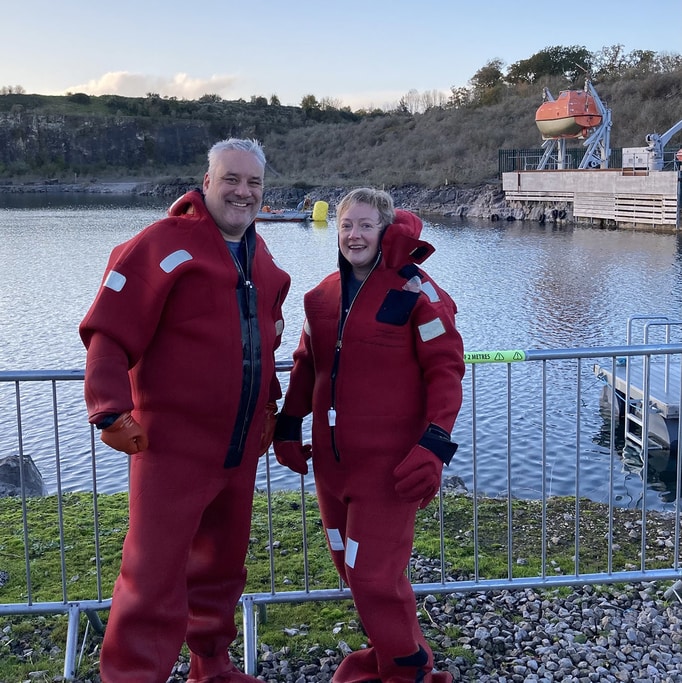
After lunch we were joined by a second instructor for the afternoon’s session. A cheery Frenchman and wind farm vessel master by the name of Luc was to lead the splash in the quarry and we all were duly kitted out with very unfetching survival suits. Oh my do these things work well, I realised when bobbing back up to the surface having jumped into the icy waters of South Gloucestershire. The only slight problem was that everyone now looked like a bright red telly tubby and unless you were one of the two ladies amongst us who were shorter, any of the others could have been equally interchangeable. The exercises and demonstrations as to how to collate and manoeuvre floating people in a group were excellent and the time passed as quickly as the clouds overhead, which is pretty much all that one can see when face up in the water. Curiously, Cromhall is also a Site of Special Scientific Interest because it is home to the protected Great Crested Newt, a creature with whom we now all had a great deal of empathy.
The US election was now starting to confuse British onlookers and seemingly the electorate as well. Tensions were building across America as the results slowly trickled in and the incumbent President enhanced his rhetoric by effectively stating that ‘they’ll have to take me out by my boots’. I don’t really understand the concept of when is a vote not a vote, and even if a vote has been cast it might be ineligible. On my grassy knoll I wondered how does one remove a leader from their office? Could one impeach them and when he doesn’t show up for bail, chain his hands to the bumper of your car and drive off…? Ironically, Sabrina was taking the class in professional responsibilities in the morning and security in the afternoon. In the case of the President, my hope was that these would not become fatefully interlinked.
I awoke early on the Thursday morning feeling equally excited and slightly nervous concerning the planned events for the next two days. To paraphrase The Great British Bake Off, it was fire fighting days! We were greeted by ‘big’ Rob, ‘little’ Rob and a trainee trainer called Chris, all of whom were active firefighters in various capacities. Big Rob is an imposing man with an appealing but dry sense of humour. I don’t think that three Weetabix for breakfast is sufficient for this guy, instead he must have a secret little bag somewhere from which they are osmotically absorbed by his body all day long. It came as no surprise to later learn that prior to being a fire fighter he had been a Navy bomb disposal expert. Little Rob is a fun loving, lean and sprightly thirty year old who had been fire fighting for seven years and was currently stationed at a nearby American air force base. I wonder what he thought about the Commander in Chief…?
Many years earlier I had a bad experience when attempting to learn to dive whilst on holiday. I simply didn’t like it and hated the wearing of a breathing mask, especially when I failed to get any air out of the thing. I was relieved when the previous user of my rig came up to me at the poolside later that day and said he failed to get any air out of the apparatus also! So, I stood there being expertly briefed by the Robs on how to breathe through something rather similar to the device I have many prejudices concerning. I must say that once we had assembled our ‘BA’ devices the very first breath through the mask was a long and drawn out affair. Somewhat melodramatically, it resembled an actor taking a long drag on their favourite Cuban cigar in a cheesy remake of an already bad film. Remarkably, I lived to write this tale and it wasn’t very long before my breathing steadied and I had only used a little bit of the bottle of compressed air we had been provided with previously.
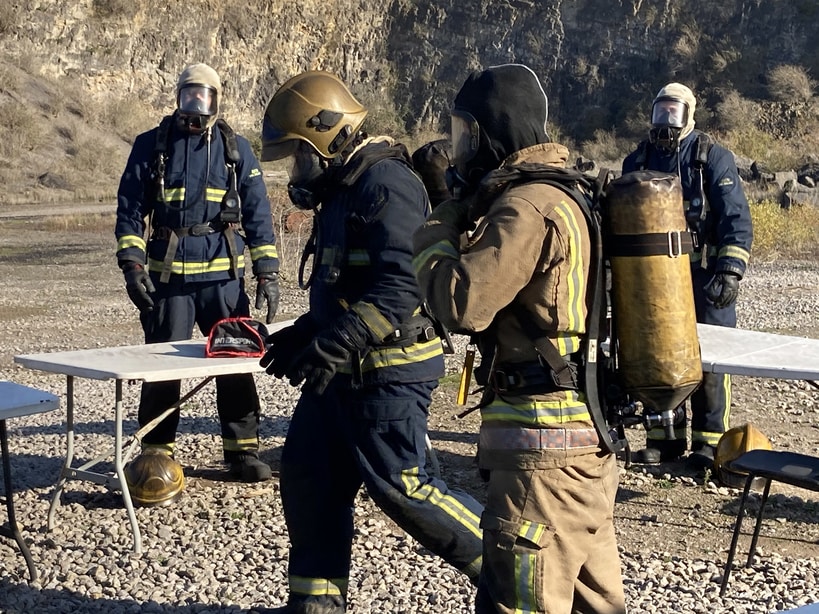
The concept of over and under pressures when describing gasses is something I was familiar with, having had a brief and unfruitful earlier career in bioscience. But what did come as a shock was the level of darkness that was experienced when undertaking the simulation of a fire. In hindsight this was a bit of a ‘duh’ moment, for it is hardly going to be highly lit with a big arrow pointing to where detritus and obstacles, or casualties for that matter, might be located in a real-life situation.
The US election still hadn’t come to a conclusion as we all assembled on the Friday morning. Big Rob had been on the Weetabix again and little Rob was sufficiently energetic that he could have run from home to the quarry that day. After putting out some fires using fire extinguishers, which was illuminating because I would have wasted half of them doing it completely incorrectly, we were being prepped for going into a confined space and fighting a real fire. We kitted up and went into our steel box, around some corners and up and down various ladders and finally arrived at where a fire was burning. Big Rob was the instructor for our smaller group at this point and he clearly thought the fire was far too puny to be interesting and calmly proceeded to put an extra five full gallon buckets of diesel onto the fire. Clearly the Weetabix infusion was working well as he prodded and shuffled the burning embers to get the fire how he wanted it!
There is nothing that prepares one for what happened next. The height of the gasses lowered to near floor level and beneath the height of our helmets, the glow of the fire disappeared and boy was it dark. As training sessions go this one was very, very live and in real time… One by one we each tackled elements of the fire using a branch (hosepipe with fire fighting nozzle and attached at the other end to a fire truck), no doubt generating far too much steam which, by the way, is unbelievably and stingingly hot. The ubiquitous scenes in movies where water is squirted everywhere simply doesn’t happen. The afternoon session was similar with the exception that we organised ourselves and came up with a plan of action, there were simulated casualties, we carried all the equipment necessary to control the fire in with us, and the Robs were mere observers. Although hot and bothered we all survived to re-emerge from the soot and view the twinkling ripples upon the surface of the cool water in the quarry.
It was, then, the end of our week of training and in a way sad that we had to say goodbye to the previously unknown people with whom we had spent this intense but ultimately enjoyable time together. I left my grassy knoll to a fever pitch of lawsuits, unrest and tension in the US surrounding the election. Not as I expected prior to arrival, a better boatsman, but with a set of skills and experiences that go beyond the enjoyment of the course: I think and ultimately hope in the event of need, that I would be a better seafarer.
Postscript: The US election now appears to be over save, of course, for the impending legal challenges and so on…



